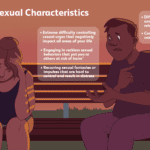The Importance of Sexual Intimacy in a Relationship
Sexual intimacy is a fundamental aspect of human connection that plays a vital role in the success and longevity of romantic relationships. Beyond the mere physical act, it serves as a powerful means of deepening emotional bonds, fostering trust, and enhancing overall relational satisfaction. By engaging in sexual activity, couples embark on an intimate journey that transcends words, allowing them to communicate and express their love in a way that no other form of interaction can.
At its core, sexual intimacy serves as a powerful affirmation of desire and attraction between partners. Through shared vulnerability and vulnerability, couples create an unbreakable bond that fuels their emotional connection. It is through the act of intimacy that individuals can truly experience the profound joy and fulfillment that comes from being deeply known and accepted by their partner. This unique form of communication allows couples to explore their desires, fantasies, and boundaries together—a process that not only strengthens their relationship but also leads to personal growth and self-discovery.
Finding Balance: Understanding the Concept of Moderation
In the realm of sexual intimacy, striking a delicate balance is key to nurturing a healthy and fulfilling relationship. Understanding the concept of moderation becomes vital to avoid pitfalls that may arise from excessive or inadequate sexual activity. Moderation does not imply dullness or deprivation; instead, it signifies a harmonious equilibrium that allows both partners to thrive.
Like a well-tuned symphony, achieving moderation in sexual intimacy requires a deep understanding and appreciation for individual needs, desires, and boundaries. It involves open communication and active listening between partners to ensure that their desires are met while considering each other’s comfort levels. By finding this equilibrium, couples can revel in the joyous exploration of their passions without falling into the abyss of excess or monotony.
 Relationship Problems Caused by Excessive Sexual Activity
Relationship Problems Caused by Excessive Sexual Activity
Intimacy is a vital aspect of a healthy relationship, but when sexual activity becomes excessive, it can lead to various problems that can strain the bond between partners. One of the challenges associated with excessive sexual activity is a lack of emotional connection. While physical satisfaction is important, emotional intimacy lays the foundation for a strong and lasting relationship. When sex becomes the sole focus, partners may neglect other aspects of their connection, such as deep conversations, shared interests, and overall emotional support.
Moreover, excessive sexual activity can also create an imbalance in power dynamics within a relationship. When one partner constantly demands or initiates sexual encounters without considering the needs and desires of their significant other, it can lead to feelings of resentment and dissatisfaction. Over time, this imbalance may erode trust and foster an unhealthy sense of control or manipulation within the relationship.
Remember, maintaining a healthy balance between physical intimacy and emotional connection is crucial for fostering a fulfilling partnership. By acknowledging these potential pitfalls caused by excessive sexual activity, couples can navigate their desires in a manner that promotes mutual satisfaction and strengthens their bond.
 The Silent Struggle: Sexual Dissatisfaction in Relationships
The Silent Struggle: Sexual Dissatisfaction in Relationships
Within the realm of sexual intimacy, there exists a silent struggle that often goes unnoticed – sexual dissatisfaction within relationships. Despite the intimate nature of this issue, many individuals find it difficult to discuss openly and honestly with their partners. This unspoken tension can lead to feelings of frustration, resentment, and even distance between partners.
Sexual dissatisfaction can stem from various factors, including differences in libido, unmet needs or desires, and lack of communication. When one partner feels unfulfilled in their sexual relationship, it can create a rift that extends beyond the bedroom. It is crucial for couples to recognize this silent struggle and address it proactively.
Recognizing Unhealthy Sexual Behavior: Signs and Symptoms
Sexuality is a natural and vital aspect of human life, but it is important to be mindful of when it starts to veer into unhealthy territory. Recognizing the signs and symptoms of unhealthy sexual behavior is crucial for maintaining a balanced and fulfilling relationship.
One common sign of unhealthy sexual behavior is a persistent preoccupation with sex that interferes with daily functioning. This can manifest as constantly intrusive thoughts about sex, an obsessive desire for sexual gratification, or an inability to control one’s sexual impulses. Additionally, engaging in risky sexual behaviors without regard for personal safety or the well-being of others can also indicate an unhealthy relationship with sex.
Another red flag is when an individual experiences distress or negative consequences as a result of their sexual behavior. This could include feelings of guilt, shame, or regret after engaging in sexual activities or experiencing relationship conflicts due to excessive focus on sex. It is important to remember that healthy sexuality should enhance our lives rather than cause distress or harm.
In recognizing these signs and symptoms, we can take proactive steps towards fostering healthier attitudes and behaviors around sex. By seeking support from professionals or engaging in honest conversations with our partners, we can develop strategies for achieving balance in our sexual intimacy.
 Overindulgence and its Consequences: When Too Much is Too Much
Overindulgence and its Consequences: When Too Much is Too Much
While sexual intimacy is an essential component of a healthy relationship, there can be instances where overindulgence in this aspect can lead to negative consequences. It is important to recognize when the balance has tipped, and sexual activities start to dominate other aspects of the relationship.
Overindulgence in sexual activity can have detrimental effects on both individuals involved. Physically, it may lead to exhaustion, physical discomfort, and even injuries. Emotionally, overindulgence can result in feelings of guilt, shame, or even resentment towards one’s partner. The constant pressure to perform or engage in increasingly extreme acts can create an unhealthy dynamic that undermines the emotional connection between partners.
Sexual Exhaustion: Understanding the Physical and Emotional Impact
Sexual exhaustion, also known as sexual fatigue, is a condition that arises when an individual engages in excessive sexual activity without giving their body ample time to rest and recover. While sexual intimacy is an essential part of a healthy relationship, pushing oneself to the limits can have profound physical and emotional consequences.
Physically, sexual exhaustion can lead to a range of symptoms such as fatigue, muscle weakness, lowered immunity, and hormonal imbalances. The body’s energy reserves become depleted due to the intense physical exertion involved in sexual activity. Emotionally, individuals may experience feelings of irritability, mood swings, anxiety, or even depression. It is crucial to understand that our bodies need time to repair and rejuvenate after intense sexual encounters.
 Hypersexuality: When Passion Becomes an Obsession
Hypersexuality: When Passion Becomes an Obsession
Passion is a powerful force that can fuel the flames of desire and bring great pleasure in the realm of sexual intimacy. However, when this passion crosses a certain threshold, it can transform into an all-consuming obsession known as hypersexuality. In this section, we delve into the intricate dynamics of hypersexuality, exploring its impact on individuals and relationships alike.
Hypersexuality, also referred to as compulsive sexual behavior or sexual addiction, is a condition characterized by an overwhelming preoccupation with sexual thoughts and behaviors. Individuals afflicted with hypersexuality often find themselves compelled to engage in excessive or risky sexual activities, unable to control their urges despite negative consequences. This condition can lead to a multitude of problems, ranging from strained relationships to decreased self-esteem and even legal issues.
This section explores the underlying causes of hypersexuality, shedding light on psychological factors such as trauma or unresolved emotional issues that may contribute to its development. It also examines the impact of hypersexuality on individuals’ mental and physical well-being, emphasizing the importance of seeking professional help and support. Moreover, we provide insights into potential treatment options that offer hope for those struggling with this condition.
The Dangers of Compulsive Sexual Behavior: Seeking Help and Support
Compulsive sexual behavior, also known as sexual addiction, is a complex and often misunderstood condition that can have serious consequences on an individual’s life and relationships. When sexual desires become uncontrollable, leading to harmful behaviors and adversely impacting one’s mental health, seeking help becomes crucial.
Individuals struggling with compulsive sexual behavior may experience feelings of shame, guilt, and a lack of control over their actions. It is vital to remember that seeking support is not a sign of weakness but rather a brave step towards healing. Various avenues exist for assistance, including therapy sessions with qualified professionals who specialize in sex addiction. These therapists offer a non-judgmental space where individuals can openly discuss their struggles and work towards developing healthy coping mechanisms.
Support groups are another valuable resource for those battling compulsive sexual behaviors. These communities provide individuals with the opportunity to connect with others facing similar challenges, fostering empathy and understanding. Through group discussions and sharing experiences, participants can gain insight into their own behavior patterns while simultaneously offering guidance and encouragement to fellow members on their journey towards recovery.
A Comprehensive Guide to Achieving Balance in Sexual Intimacy
Creating a harmonious and fulfilling sexual relationship requires understanding the delicate art of balance. To achieve this, couples must engage in open and honest communication about their desires, boundaries, and expectations. Start by setting aside dedicated time for intimate moments, allowing both partners to prioritize and cultivate their connection. By incorporating variety into the bedroom, experimenting with new techniques or fantasies, couples can invigorate their sex lives while maintaining a healthy balance.
Furthermore, it is vital to remember that sexual intimacy extends beyond physical gratification alone. Emotional bonding is equally essential. Engaging in activities that foster emotional intimacy – such as sharing dreams and aspirations, engaging in deep conversations or engaging in non-sexual physical touch – creates a strong foundation for overall relationship satisfaction. By exploring shared interests outside of the bedroom and cultivating emotional closeness through acts of kindness and appreciation, couples can strengthen their bond both inside and outside the realm of sexual encounters.
Conclusion
In conclusion, finding the right balance in sexual intimacy is a delicate art that requires open communication, self-awareness, and a deep understanding of one’s own desires and boundaries. It is crucial to remember that every individual and every relationship is unique, with their own set of needs and preferences. By recognizing the signs of excessive sexual activity and addressing any underlying issues, couples can embark on a journey towards a healthier and more fulfilling intimate life. Ultimately, achieving balance in sexual intimacy can lead to profound emotional connection, increased satisfaction, and a stronger foundation for long-lasting relationships. It is through open dialogue, honesty, and mutual respect that couples can navigate the complexities of sexual desire while nurturing their emotional well-being. By prioritizing each other’s needs and desires alongside personal boundaries, partners can create an environment where both physical pleasure and emotional fulfillment thrive harmoniously. So let us embrace the quest for balance in our intimate lives – it is within our reach to cultivate a love that flourishes in both passion and ser








